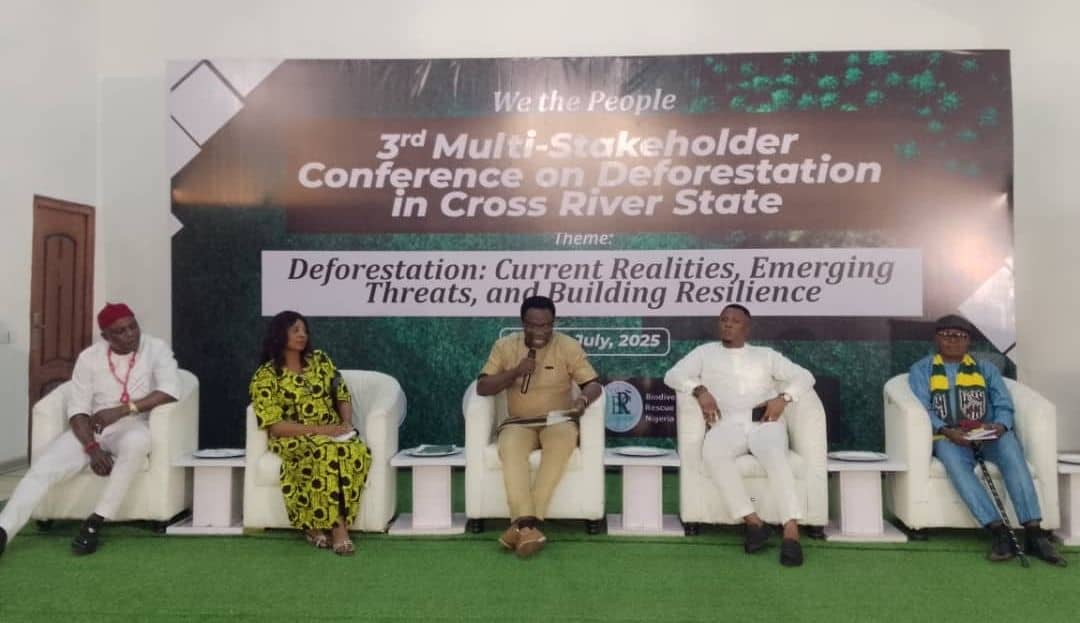Stakeholders at the conference.
By Kelvin Obambon
The destruction of Cross River’s rainforest, the ‘largest’ remaining pristine forest in West Africa, is reaching a catastrophic level, prompting warning by stakeholders.
They said without immediate action, the rainforests could vanish entirely within a few decades as it is estimated that from 2001 to date, Cross River has lost more than 134,000 hectares of forest, marking one of the fastest deforestation rates globally.
Stakeholders issued the warning at a one-day multi-stakeholders’ conference on deforestation organized by “We The People Center For Social Studies and Development” in Calabar on Thursday.
The conference which has been held annually in the last three years, is themed, “Deforestation: Current Realities, Emerging Threats, and Building Resilience.”
Executive Director of We The People, Ken Henshaw, in his address lamented that Cross River’s rainforest, once safeguarded by proactive communities, is now disappearing at an alarming rate due to a combination of misguided policies, external exploitation, and regulatory failures.
He said, “despite being home to nearly half of Nigeria’s surviving forests and a haven for endangered species like gorillas and forest elephants, illegal logging, weak enforcement, and ineffective bans have devastated the ecosystem”.
Henshaw stated that, the 2008 government ban aimed at curbing forest activity backfired with communities stripped of their stewardship role, external loggers flooded in, accelerating forest destruction rather than halting it.
He said that the promised benefits from international carbon credit schemes failed to materialize, leaving local livelihoods exposed while illegal timber trades flourished and profits benefited outsiders.
“Communities have always been the ones conserving the forest, but the government propelled the destruction of the forest. In 2008, that rule changed. The government immediately introduced a ban on all forest activity. Community members were stopped from farming in their forests. The state government was actually incentivized by the UN RED programme, aimed at reducing emissions from deforestation and forest degradation.
“But nearly 15 years after, the carbon credit did not come. And in fact, because communities were disincentivized from protecting their forests, all external elements, loggers and all that came into the forest and effectively destroyed the entire forest. Rather than preserve the forest, the 2008 ban led to the highest spate of deforestation ever recorded in Cross River.
“I read a report once that said the current destruction of the Cross River rainforest is probably the highest destruction of rainforest anywhere in the entire world. It’s higher than the spate of destruction in the Amazon. That’s what the state is going through,” he said.
Henshaw attributed recent windstorms that devastated properties in Calabar, rising environmental temperature, biodiversity loss, disrupted fisheries, community hardship, among others as some of the immediate impacts of deforestation in Cross River.
The keynote speaker, Dr Nnimmo Bassey, in his address, examined the colonial root of deforestation, highlighting the exploitation and deception behind the practice.
According to him, “Some forests were designated or called evil forests by colonial forces whose major objective was to destroy our culture, destroy our way of living, and destroy our biodiversity hotspots.”
“The places that were designated evil forests were places that had deep cultural significance for our people. They were places where certain species were protected, and some communities had certain animals they wouldn’t kill, and they were all in those places.
“And because people paid particular attention to those very unique locations, those who wanted to destroy the foundation of our communities, the culture of our people, they designated them evil forests and set about destroying them.
“So that was actually one of the major strategies used to deforest or to cut off places where the colonialists didn’t have influence over,” he said.
Sharing his experience, the clan head of New Ekuri in Akamkpa local government area, Obol Abel Egbe, said his community imposed traditional injunction on its forest, thus preventing it from being destroyed by illegal loggers.
The traditional leader thanked We The People for continuously creating awareness on the dangers of deforestation and environmental degradation, saying it has strengthened his community’s resolve to protect their forest against intruders.
The conference featured presentations on, ‘The Emerging Dynamics of Mining and Deforestation in Cross River State: Review of WTP’s Mining Report’ and ‘Building Global Alliances and Strategies to End Deforestation’. There were also panel sessions on ‘Legislative Opportunities for Improving Forest Management: Cross River Forest Law in Focus’ and ‘Community Strategies and Opportunities for Protecting Forests and Preserving Wildlife’.
Some of the key factors identified as drivers of deforestation in Cross River are, lack of accurate data collection, duplicity of agencies who do not work as a web, lack of proper assessment before negotiations, exclusion of communities in the problem-solving process, lack of basic amenities for forest dependent communities, lack of proper funding and support for the agencies saddled with the responsibility of forest protection, and lack of accountability by concerned persons.
Others are lack of proper licensing framework, illegal logging, low political will to protect the forest, paltry fines as penalties, forest as a source of revenue for the state, uniformed field staff of the forest are incapacitated, royalties not given to the forest communities and its inhabitants, covert involvement of politicians in carrying out professional forest duties, emergence of cult groups, communities inhabitants are less empowered to protect their forest, as well as inadequate political will on the part of government to address deforestation.
In view of these factors, stakeholders at the conference recommended the inclusion of a traditional knowledge or means as an additional strategy to confront the threats of illegal logging; stakeholders should deal with the crisis arising from mining; increase forest fines as penalties to deter loggers and other drivers of deforestation; forest should not be solely depended upon by the state to drive revenue; give royalties to forest communities and emplacement of stringent penalties and better licencing framework.
Other recommendations included the integration of local communities in the enforcement of the forest laws; synergies with NGOs and other forest protection partners; review of the 2010 Forestry Commission laws to capture current realities like climate change, mining prohibition laws in reserved areas and others; protection for communities leaders who protect the forest; provision of basic amenities for forest dependent communities, among others.
Solidarity and goodwill messages were received from NGO Coalition on Environment, the Cross River State National Park, Forestry Commission, Cross River State Ministry of Environment, Nta Ekpo Community in Odukpani, Wildlife Conservation Society, among others.










